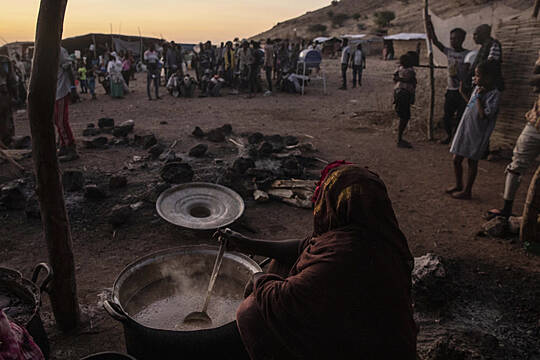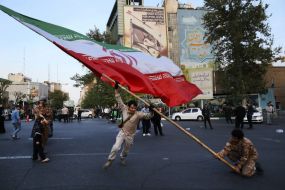Ethiopian prime minister Abiy Ahmed again ruled out dialogue with the leaders of the defiant Tigray region but said he is willing to speak to representatives “operating legally” there.
His comments came during a meeting with three African Union (AU) special envoys trying to end the deadly conflict between federal troops and the region’s forces.
The meeting occurred as people fled the Tigray capital in fear of an imminent assault after Mr Abiy ordered the “final phase” of an offensive to arrest the leaders of the Tigray People’s Liberation Front (TPLF), the region’s leaders.

Mr Abiy’s government and the regional one each consider the other illegitimate.
There was no immediate word from the three AU envoys, former Liberian president Ellen Johnson Sirleaf, former Mozambique president Joaquim Chissano and former South African president Kgalema Motlanthe.
AU spokeswoman Ebba Kalondo did not say whether the envoys can meet with TPLF leaders, something Mr Abiy’s office has rejected.
In a message to The Associated Press, senior Ethiopian official Redwan Hussein said a meeting was “not possible”.
He added: “Above all, TPLF leadership is still at large.”
He called reports that the TPLF had appointed an envoy to discuss an immediate cease-fire with the international community as “masquerading”.
The prime minister’s office said he appreciated the AU envoys’ “elderly concern”.
He also told them his government’s failure to enforce the rule of law in Tigray would “nurture a culture of impunity with devastating cost to the survival of the country”.

Mr Abiy, last year’s Nobel Peace Prize winner, has rejected international “interference”.
Fighting reportedly remained well outside the Tigray capital of Mekele, a densely populated city of a half-million people.
Civilians had been warned by the Ethiopian government they would receive “no mercy” if they didn’t separate themselves from the TPLF leaders in time.
Mr Abiy told residents on Thursday to stay indoors and disarm as the army, with tanks, was given the order to move in. His government has vowed to protect civilians.
With communications and transport links severed, it remains difficult to verify claims about the fighting that erupted on November 4.
The TPLF once dominated Ethiopia’s government but has been side-lined under Mr Abiy’s rule.

Hundreds, perhaps thousands, of people have been killed. The fighting threatens to destabilise Ethiopia, which has been described as the linchpin of the strategic Horn of Africa and could even destabilise its neighbours.
Food and other supplies are running out in the Tigray region of six million people.
The United Nations continues to urge immediate access for humanitarians that is neutral and impartial. Ethiopia’s government has said a “humanitarian access route” would open under the management of the country’s ministry of peace but gave no details.
Multiple crises are growing. Some of the tens of thousands of refugees from Eritrea who are living in camps in northern Ethiopia have been in the line of fire as fighting sweeps by them.
Refugees have also told The Associated Press that Ethiopian forces near the border with Sudan are preventing people from leaving Ethiopia, while refugee crossings have largely slowed to a trickle. Ethiopia’s government has not commented on that.

More than 40,000 refugees have crossed into a remote part of Sudan where local communities and humanitarian workers struggle to provide food, shelter and care. Nearly half of the refugees are children.
The spread of Covid-19 is just one concern.
Mohammed Rafik Nasri, from the UN refugee agency, said: “We cannot keep social distancing here in the camp.
“It is really challenging among the several issues in need that are growing because the number is growing.
“Today we are receiving a convoy of 1,000 arriving in the camp. And shelter is one of the biggest challenges that we have at the moment.”
Scared, sometimes without word of loved ones left behind, the refugees continue to share horrific accounts of the fighting and plead for it to stop.
One refugee Atsbaha Gtsadik said: “It makes me so sad. The country has no peace.
“You see one tribe killing another. It is so hard.”

Juliette Stevenson, a spokeswoman with the UN refugee agency, said: “Reports of conflicts around refugee camps are very concerning.”
Communications and transport restrictions make it impossible to verify camp conditions, she added.
But the 96,000 Eritrean refugees “will run out of food as soon as Monday if supplies cannot reach them,” the agency said in a statement.
The International Committee for the Red Cross (ICRC), in a rare dispatch from inside Tigray, warned that health care facilities are running out of drugs and other supplies and health workers need help caring for the wounded.
While travelling in western Tigray, the ICRC found a number of displaced people living in a makeshift camp without food, water or medical care.
An ICRC statement said: “They told us they feared for their lives and that they wanted safe passage out of the area.
“So much is still unknown on the level of violence and subsequent suffering that people in the Tigray region have endured in just three weeks.”







